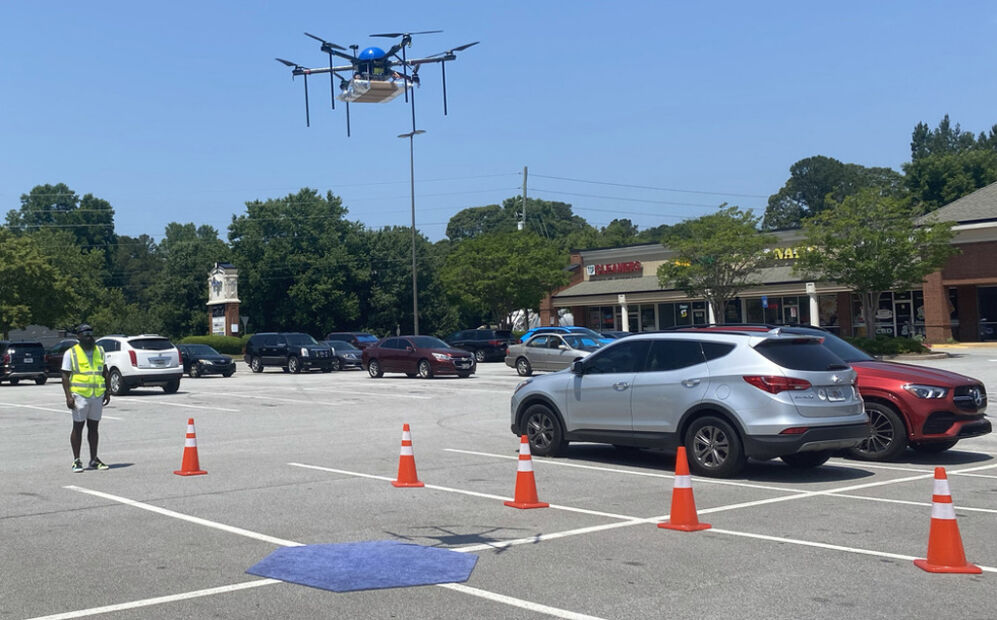Drone Express navigates with Microsoft AI
- December 12, 2022
- Steve Rogerson

Ohio-based last-kilometre logistics company Drone Express has partnered with Microsoft to launch a version of its DE-2020 drone using artificial intelligence (AI) for in-flight navigation.
This creative collaboration will equip delivery drones with Microsoft Azure to host the AI and use Azure Machine Learning to train machine-learning models.
With AI implemented, drones can safely make live, in-flight decisions to deliver packages in an urban environment. The first aircraft with this hardware will enter production at the end of this year and provide users with safer and faster last-kilometre delivery.
“While our competitors are focusing on how to carry more weight, we are focusing on building a more intelligent aircraft,” said Beth Flippo, chief executive officer at Drone Express. “This technology, combined with our proprietary mesh networking capabilities, will propel our aircraft to the forefront of autonomous airborne logistics.”
Drone Express is on track to become one of the first companies to attain a part 135 FAA certification for autonomous drone delivery.
Drone Express is an aviation company specialising in last-kilometre logistics by embracing autonomous flight. Founded in 2018 and headquartered in Dayton, Ohio, the company uses drones to make safe, reliable, autonomous, eco-friendly package delivery to users across the country. It has earned a limited spot in the Type Design and part 135 Domestic Air Carrier Certification programmes through work with the FAA and secured strategic nationwide corporate partnerships with Kroger, Papa Johns, Winsupply and other retailers.
Drone Express will be one of only four companies certified to perform airborne cargo delivery for compensation in the USA.
“The number one item we’re delivering is ice cream,” said Flippo. “Drones are fast enough to deliver it before it melts.”
Drone Express began delivering groceries in July 2021. Since then, it has begun working alongside Papa John’s locations in Georgia and Ohio for pizza delivery, along with engaging Winsupply for construction supply delivery in Ohio.
Currently, Drone Express pilots must maintain a line of sight with the drones, so the company must send one pilot to the store for order pickup and another to the destination to receive the drone. Using a mesh network, pilots hand off control of the aircraft in mid-air to land the package safely.
The need to include human pilots increases costs for both Drone Express and its customers. As a result, the company has been working on the certification process for autonomous deliveries. With zero safety incidents in over a year of operation, Drone Express is close to achieving the demanding type and production certificates.
Using Azure Machine Learning, Drone Express trains its machine-learning models by feeding them photos of obstacles and scenarios the drones could encounter and teaching them to identify safe delivery areas. Because the models must run on the drone in real time, Drone Express is developing hardware that can run the model computations in a power-constrained environment while remaining lightweight and not overheating.
The first aircraft with this hardware will enter production by the end of this year. Drone Express is also working with the team at Microsoft to build AI models that use minimal processing power while delivering inferences quickly so the drone can react mid-flight.
Implementing machine learning will increase the safety of Drone Express deliveries by removing the potential for human error.
“A pilot on the ground could be having a bad day, which can affect safety,” said Flippo. “The drone isn’t going to make the same mistakes.”
Moreover, deciding where to deliver the package while keeping people at a safe distance can cause pilots anxiety. Using AI, the drones will be able to choose a delivery site in seconds, leaving the pilot to focus on keeping onlookers out of the way. Once the AI is implemented, Drone Express expects to reduce the time it takes to choose a safe spot and release the package from around five minutes to one minute.
“Our team embraces anything that’s going to make us safer and better and put us ahead of the competition,” said Flippo. “Our people understand that implementing AI is going to make their jobs better and help them move into other areas like air traffic control. Part 135 is key to being able to fly beyond visual line of sight.”
From the beginning, Drone Express has worked with Microsoft cloud technology. It chose Azure to host the mobile app that customers use to order deliveries, and it uses Azure Kubernetes Service to deploy and scale containers.
“Using Azure has changed our perspective, not only on AI, but also on what we’re doing as an organisation,” said Brandon Mabey, chief strategy officer at Drone Express.




